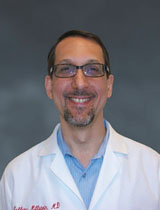Takeaway
Excellent clinicians help patients expand their circle of trust, beyond their favorite physician, to include more members of the healthcare team.

Connecting with Patients | February 10, 2020 | 2 min read
By Jeffrey Millstein, MD, Penn Medicine
“Doc, I wasn’t going to let anyone tell me I should go to the emergency room except you.”
My long-time patient, Mr. G, greeted me with this declaration when I saw him in the office after my two-day absence to attend a medical conference. It was punctuated with a few gasps to catch his breath and the hiss of nasal oxygen at full blast. As I took him in, short of breath and diffusely swollen with interstitial fluid, I felt simultaneously honored and disturbed by his trust. What had I done to lead him to believe that I was the only clinician who could capably decide that he needed hospitalization?
Over the years, it’s been common for patients to seek my approval for tests and procedures that other clinicians or specialists have recommended. This is especially the case in recent years, as many relationships with my patients have reached the decade or more mark, and we have developed a strong connection. What they’re seeking is not my knowledge, but my blessing, knowing that I’m looking out for their best interest.
While considering Mr. G’s near-critical deterioration in my absence, I recognized a vulnerability that our relationship had created. Mr. G had come to trust me, but not my team. Perhaps I became so proud and pleased with acquiring his trust that I didn’t make enough effort to display my own trust in my partners and support staff.
Today, patients have many ways to contact and interact with physicians in addition to coming into the clinic. There are patient portals, phone follow-up and, in some practices, telehealth visits. I’ve even given some of my long-term complex patients my personal email or cell phone number if they’re unable to reach me by other means. They rarely use them. Despite this growing menu of routes to connect with a primary provider, medicine is fundamentally a team sport.
No single clinician can be available every time a patient is in need. While this sounds obvious, the breadth of responsibility it involves may be less so. We are all accustomed to giving a “sign-out” or summary of unresolved patient issues to a covering clinician; this is ingrained in the culture of medical training and practice. Mr. G helped me realize how expressing the strong confidence I have in my covering colleagues is just as important. I need to pay the trust forward.
Not only do clinicians need to be interdependent, but also we need to manage up and trust our entire care team. This way, our group can develop and maintain a standard of excellence that is conveyed to patients at every touchpoint, like a trusted brand. Further, we can demonstrate our trust in the way we speak to and about each other.
When Mr. G returns for his post-hospital follow-up visit, I’m going to find a few minutes to ask him how he feels about our office care team, and express my complete trust in them. Gradually, I’ll strive to help all of my patients understand that, while I will always be their primary care provider, everyone in our medical “home” has their back.

